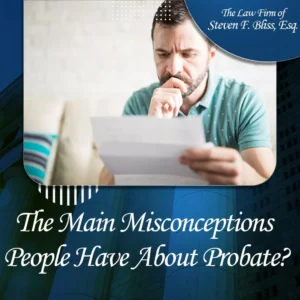All Wills go to probate, whether it was handwritten or typed?
The Main Misconceptions People Have About Probate?
Listen to this Article on:
Misconceptions About Probate & Simpler Options To Handle Probate.
People’s number one misconception about probate is that having a will means no probate; all Wills go to probate, whether it was handwritten or typed, primarily because only the judge can sign over the assets to the beneficiaries.
Another misconception is that probate isn’t expensive when it is. Another misconception is that if a home has no equity, it won’t go through probate when the amount of equity is irrelevant. In California, if you have an asset or assets that total more than $166,250, you will go through complete formal probate. There are short-form probates and an affidavit process for estates more petite than that. Many people think they don’t have that much, but if you have a house in California, you’ll probate.

Is There a Way to Avoid Probate?
There are a few ways to avoid probate; that’s what I do in my practice. I’ve been doing estate planning for over 30 years, and my main job is to keep people out of the probate system. People often add someone to their bank account so that when they die, the person gets the bank account, but that can be a dangerous proposition since you’re giving someone half interest in your property. Moreover, they can take it anytime they want.
Please Help Us Spread The Word By Giving Us a 5 Star Rating on This Article
Free Initial Consultation with
Steven F. Bliss Esq.

★ ★ ★ ★ ★

The primary way to avoid probate in California is to set up a revocable living trust. Whether they call it a Family Trust or Intervivos trust, it is a revocable trust which holds your assets while you’re alive; then, when you die, someone, you designate will manage the trust assets and distribute them to your heirs based on instructions set out in the trust document. That’s how people in California stay out of the probate system.
If there is a Very Small Estate,
Are There Other Simpler Options?
Suppose the gross estate is less than $166,250 in California. In that case, you can do a small estate affidavit under California Probate Code Section 13100. That declaration names the decedent and the beneficiary and states that the total assets are less than $166,250; it is signed and notarized and taken to various entities, such as banks, investment, or mutual fund companies to distribute the assets. If there is a piece of real estate worth less than $150,000, a straightforward process is entitled a “petition to succession.” It takes about 90 days to get through, but it’s a brief and much less expensive proceeding.
How are Estate Creditors Handled?
When probate is opened, a notice must be published in a newspaper. Any creditors you’re aware of must be notified of the death to let them know probate has been opened. Creditors generally have 120 days to file a “proof of claim” against the estate. The executor will review and determine whether it is valid. If it is valid, the executor will pay it; if it is not valid, then some reasonable settlement will be negotiated, which is how all creditors get handled.
If the creditors miss the deadline, they’re out and get nothing. The court is adamant that creditors only get a certain amount of time to claim a debt is owed to them so the court can get the probate administered, the assets distributed, and the case closed. The courts don’t want to be tied up in creditor claims forever.
Do People Have Difficulty With Estate Creditors When Not Working With An Attorney?
When someone dies with an estate and creditors, they need to have competent counsel. Those who think they can do this without an attorney are asking for trouble; honestly, an attorney who represents himself has a fool for a client, so even an attorney shouldn’t express himself in a probate proceeding, let alone an individual with no legal training. It’s a recipe for disaster, so when dealing in the probate system, they should be represented, protected, and make sure they’re fully complying with the law.
Do the Beneficiaries Have to Pay the Creditors from their Pocket?
The answer is no; when you file probate, properly notice creditors, and disclose all the assets, that is all that will be available to creditors. Often, when we have an insolvent estate, we negotiate settlements with creditors to get the beneficiaries some money. That happens a lot of the time when we have an insolvent estate, but sometimes creditors fight to the death to get every last penny, so it all depends.
Sometimes, we can get the money to the beneficiaries, and sometimes we can’t. Notwithstanding, heirs are not liable for someone else’s death.
